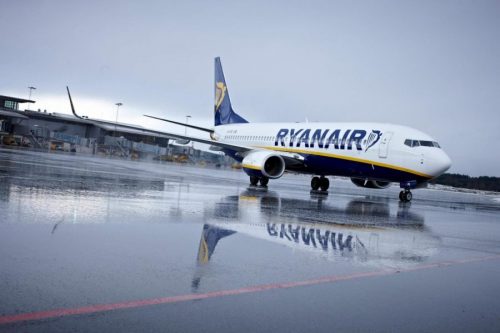Budget carrier braces for tough re-start but eyes future opportunities

Budget carrier Ryanair reported better annual revenues for the year to March 31, but lower pre-tax profits.
The airline, which operates 46 routes from Manchester Airport and 34 from Liverpool John Lennon Airport, also felt the impact of the March COVID-19 shutdown in aviation with a slight fall in annual load factor
Ryanair has grounded its fleet, but said it intends to resume 40% of its scheduled flights by July 1.
It said it expects to record a loss of more than €200m in the first quarter, with a smaller loss expected in the peak Summer second quarter, due to the impact of COVID-19.
However, it sees opportunities for growth as the aviation sector re-sets after the coronavirus pandemic, it said.
Today’s announcement revealed an annual turnover of €8.49bn, compared with €7.69bn the previous year.
Pre-tax profits of €670.3m was down on last year’s €948m.
Throughout the year, passenber numbers grew by four per cent to 149 million, although the load factor, or number of available seats sold, slipped from 96% to 95%.
The airline said today: “When group airlines return to scheduled flying from July, the competitive landscape in Europe will be distorted by unprecedented quantums of state aid (in breach of EU rules) under which over €30bn has been gifted to the Lufthansa Group, Air France-KLM, Alitalia, SAS and Norwegian among others.
“We, therefore, expect that traffic on reduced flight schedules will be subject to significant price discounting, and below cost selling, from these flag carriers with huge state aid war chests.”
The carrier said its fuel bill rose by 14%, or €335m, to €2.8bn due to higher prices and four per cent traffic growth.
It said the group has recorded an exceptional €353m, net of tax, hedge ineffectiveness charge on fiscal year 2021 fuel hedges, due to COVID-19 groundings, offset by favourable €/$ currency hedges for fuel and delayed capital expenditure.
Today’s statement said the group’s balance sheet is one of the strongest in the industry with a current cash balance of €4.1bn – Ryanair recently raised £600m under the UK’s CCFF scheme – and 330 unencumbered B737s, 77% of the owned fleet.
Since mid-March, the group has implemented a series of measures to preserve cash, cut costs, cancel share buybacks and defer operating and non-essential capital expenditure spending.
As a result, average weekly cash burn has dropped from approximately €200m in March to just over €60m in May.
It said this liquidity will enable the group to weather COVID-19 and emerge stronger when the crisis passes.
Looking ahead, the group said fiscal year 2021 will be difficult for the Ryanair group as its airlines work hard to return to scheduled flying following the COVID-19 crisis.
“Unlike many flag carrier competitors, Ryanair will not request or receive state aid. Consultations about base closures, pay cuts of up to 20%, unpaid leave and up to 3,000 job cuts – mainly pilots and cabin crew – are under way with our people and our unions.
“Our commercial team are also in active discussions with our airport partners regarding S.20, and beyond, capacity allocations.
“Given the uncertainty over the impact and duration of the COVID-19 pandemic, coupled with no visibility on what customer behaviour and demand will be following a return to service, Ryanair cannot provide FY21 PAT guidance at this time.
“The group expects to record a loss of over €200m in Q1, with a smaller loss expected in Q2 (peak Summer) due to a substantial decline in traffic and pricing from COVID-19 groundings.
“The group currently expects to carry less than 80m passengers in FY21 (almost 50% below its original 154m target).”
It added: “Ryanair’s return to scheduled flying will be rendered significantly more difficult by competing with flag carrier airlines who will be financing below cost selling with the benefit of over €30bn in unlawful state aid, in breach of both EU state aid and competition rules.
“As we look beyond the next year, there will be significant opportunities for Ryanair’s low cost, growth model as competitors shrink, fail or are acquired by government bailed-out carriers.”




